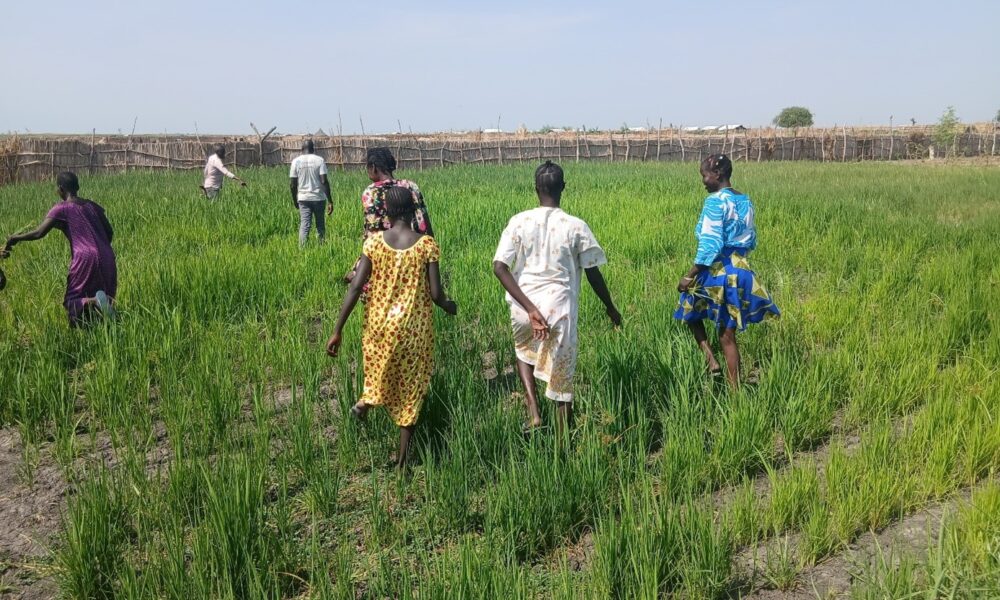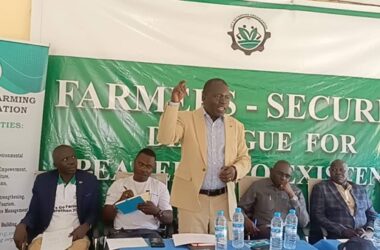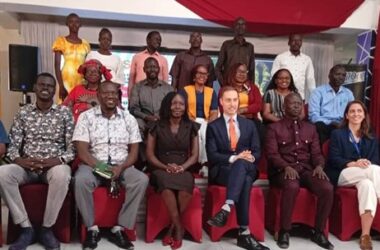By Lodu William Odiya
At least 100 farmers in the Pakur Boma under Rubkona Payam have been empowered through a community-driven agricultural initiative aimed at boosting food security and strengthening livelihoods and building resilient to the communities.
The program, led by Save the Children, Tearfund and Coalition for Humanity (CH), War Child holland and WOCO provided farmers with training in modern farming techniques, access to improved seeds, and small-scale tools to enhance productivity.
Beyond agriculture, the initiative also focused on building entrepreneurial skills, enabling women to diversify income sources and support their families more sustainably through Village Saving Loan Association (VSLA). The farm consists of 100 members, 20 per groups, in total of 65 women and 35 men.
Speaking during a visit to Pakur farm on Thursday, Simon Khamis James Yambala, Coalition for Humanity’s Food Security and Livelihood (FSL) Field Manager emphasized that the organizations have trained 100 farmers of which majority of them are women.
“Out of these farmers, 65 women, and 35 of them are men. The group is dominated by women; we trained them on climate smart agricultural practices. We gave them resilient crops, which can withstand the flooding, and we identified one of them as rice” he said.
He also added that sugarcane, yams and sweet potato vines are also the most important resilient crops distributed to these farmers in Rubkona as they resist water.
Khamis underscored farmers were trained on how to plant their rice as one of the value chain crops, due to the demand in Rubkona market.
Additionally, Khamis highlighted that with the training, the farmers could also embark on producing vegetables to help their families.
“They can grow vegetable production in their own home. At the end of the day, the issue as to why we are integrating a vegetable production, it can also like reduce the cases of malnutrition among the children under five years and lactating mothers” he stressed.
“Most of them are also widows, due to the time of crisis after getting the money, it will also support paying their children in school, medical services out of the money that they generate from the sale of vegetable products” he added.
He encouraged farmers to integrate farming as a serious business, considering climate smart agriculture practices to avoid harm to the environment. They were as well thought on environmental conservation (plating planting of fruit tree for example mango, guava, lemon avocado and woodlots.
“We encourage them to just clear the crop residues and keep it on the farm discouraging burning. At the end of the day, it maintains and improves soil structure. It adds nutrients to the soil, because we don’t want to destroy or to degrade the virgin soil. we are calling on our donors and the government to support the issue of land reclamations to ensure farmers have access to verse land for cultivation” he stated.
On her part, Tapisa Nyankuan, who is the chairlady of the Pakur Farmers group, appealed to the non-governmental organization to urgently support farm tools, more different varieties of improved seeds, and water pumps for irrigation, to help sustain food production during the dry season.
This appeal comes at a time when Rubkona continues to grapple with climate challenges, displacement, and economic hardship.
The farmers hope that timely intervention will transform their fields into reliable sources of food and income, ensuring resilience against future crises.
Community leaders hailed the initiative as a milestone in advancing women’s economic independence.
“Empowering women farmers is not just about food production, it’s about giving them the tools to lead, to support education, and to uplift entire households,” local official said.
The initiative comes at a critical time, as Rubkona-Unity state continues to recover from years of conflict and climate-related challenges and flooding.
By strengthening farmers and women’s role in agriculture, the project contributes to resilience, peacebuilding, and long-term development in the region.
Since January 2024, the program has supported community-led peace dialogues, strengthened women and youth leadership, promoted entrepreneurship and agricultural productivity, improved natural resource management, and expanded access to sustainable clean water.




